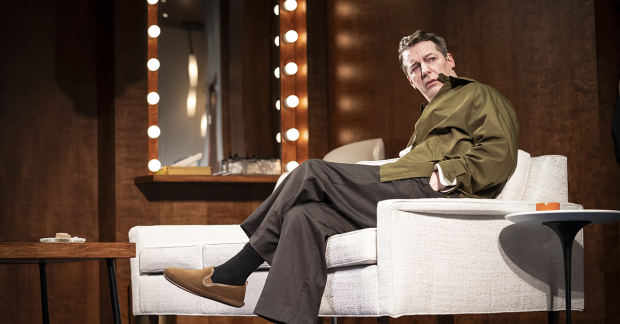Review: Dazzling Pianist Sean Hayes Plays Oscar Levant in Goodman World Premiere
Hayes stars in Doug Wright’s ”Good Night, Oscar”, directed by Lisa Peterson.

About 80 minutes into Good Night, Oscar at the Goodman Theatre, leading man Sean Hayes sits at a Steinway grand and plays George Gershwin's "Rhapsody in Blue." Portraying Oscar Levant, Hayes actually plays live and knocks it out of the park. It's an electrifying moment of revelation, even for those few who know that Levant once was America's highest-paid concert pianist. But Sean Hayes? This convincing and memorable coup de théâtre balances out a weight of quirky, jerky artifices in Doug Wright's world premiere, almost certainly penned for Hayes. How many actors have both the comic and musical chops to pull this off?
Levant (1906-1972) is chiefly known as the chain-smoking, wise-cracking second banana to Gene Kelly and Fred Astaire in movies such as An American in Paris and The Band Wagon. Older viewers also may remember him as a chain-smoking, wise-cracking and constantly twitching guest on Jack Parr's Tonight Show. Although only in his 50s, Levant was in physical and psychological shambles, addicted to prescription drugs and cigarettes. His famous sardonic wit still intact, Levant played up his hypochondria and neuroses on TV.
Good Night, Oscar fictionalizes a Levant appearance with Jack Paar (Ben Rappaport). The precise year isn't stated, but the New York-based Tonight Show is in Los Angeles for the first time, broadcasting from the West Coast for a few weeks. NBC-TV president Robert Sarnoff (Peter Grosz) is nervous about Levant and fearful that his wisecracks will overstep which they do, egged by Parr.
Half of this 100-minute play concerns whether drug-addled Levant will appear at all, sprung from a mental institution by his wife, June Levant (Emily Bergl), for four hours to fulfill his TV commitment. The back half presents the show proper and its aftermath. Levant, long viewed as the chief interpreter of George Gershwin's concert music, is visited several times by Gershwin's ghost (John Zrodjeski, in white tie and tails), a reminder of their prickly friendship.
A mighty weight of exposition is crammed into this play to make it work, and the playwriting devices feel forced and stagey, beginning with Gershwin's ghost. Then, there's a young, wide-eyed production assistant (Ethan Slater) who knows only Levant's movies, and conveniently asks questions that allow Levant to reveal his backstory. There's an orderly (Tramell Tillman) accompanying Levant from the hospital, who conveniently discusses Levant's emotional issues and packs a satchel of prescription drugs, which you know is going to be opened. And there is Sarnoff as antagonist, network censor, and moralizer who hovers over the show that night. It's difficult to buy Sarnoff's backstage interference and moralizing for a second, despite a sincere performance by Grosz.
It comes down to Hayes, then, who launches himself physically and emotionally into the character, while not looking one bit like the dark-eyed, round-faced Levant. He's actually about the same age as Levant is in the play (though he looks slightly older), and he adds an astonishing assortment of tics, twists, twitches, trembles, slumps, blinks, and bobs. They seem tremendously self-conscious at first — part of this production's not-always-intended staginess — but videos of Levant reveal they are true-to-life. Eventually you grow used to them, and they become almost sensational when Hayes is hunched and contorted over the piano, playing for all he's worth. At that moment, one recognizes the emotional force Hayes has put into the role. Oscar Levant was a living caricature and there's no other way to play him.
Director Lisa Peterson's physical staging is fine as she wrestles with the play's odd structure, that spectral Gershwin above all. In a star vehicle, one never knows what influence a director has had over the star's interpretation, beyond playing traffic cop, so I can't really tell where her contribution to Hayes's performance begins and ends.
The scenic design by Rachel Hauck resembles nesting boxes. First and smallest is Jack Paar's richly paneled office, then Levant's comfortable dressing room, and finally the enormous but minimally furnished TV studio set, with soundproof walls resembling a padded cell (one assumes an intentional reference to Levant's mental state). The plain-spoken costumes by Emilio Sosa mostly are suits, ties, and sweaters, with one lovely print gown for June Levant. The lighting by Ben Stanton and Caroline Ortiz Herrara, varies from ghostly-ghastly for Gershwin to pseudo-flood lighting for the TV set. Similar to other aspects of the production, some of it is intentionally stagy.
Most of the Good Night, Oscar company is New York-based, a signal this production has Broadway ambitions, although nothing has been announced. With a month to run at the Goodman Theatre (through April 24), there's time to make Sarnoff more sophisticated (as he was) and tone down Oscar's tics and twitches just a touch. There probably also is a better way to address Levant's love-hate relationship with Gershwin, but that's a conceptual fix that won't happen in Chicago.
Ultimately, the success of Good Night, Oscar rests on the shoulders of Sean Hayes and his fan base. He's taken on an unlikely hero to prove that he can do more, and deserves credit for his ambition.











